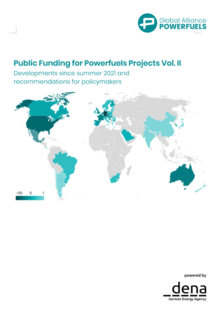This report is based on an extended and updated version of the Global Alliance Powerfuels’ database of public funding programmes for green hydrogen and other powerfuels (see here for the previous report on the topic). The database now includes 224 support schemes from 44 countries and the EU. The report analyses the geographical and technological scope of these funding programmes, and differentiates between funding structures, categorising programmes into stand-alone (independent) and overarching programmes with sub-programmes. Based on the results of a best-in-class assessment, the report also provides an in-depth look at five selected support measures from different world regions and their priorities.
The volume of the evaluated programmes has grown from around €200 billion to €660 billion from summer 2021 until November 2022. There is a trend towards more funding for market deployment as well as more funding covering operational expenditures (OPEX), which now accounts for 22% of the funding programmes.
Despite an increase in funding in the US, Europe still leads in terms of absolute funding volume, while Germany is ahead in terms of the number of funding programmes for which powerfuels are eligible. South America and Africa stand out as regions with a number of newly established funding programmes.
Further public and private investments into powerfuels are needed for a path that is consistent with achieving net-zero emissions by 2050 globally. In addition, 90% of announced projects currently still lack a final investment decision (FID). This shows that more public funding is still needed, as well as greater activation of private capital.
Although the report shows a shift away from R&D funding, it remains important to develop powerfuels technologies at lower technology readiness levels. Further funding is also needed for OPEX, infrastructure and off-take. The report further highlights the importance of a conducive regulatory framework, as it affects the eligibility and effectiveness of programmes. Finally, funding for projects in the Global South can face different and/or additional challenges than for projects in the Global North. Specifically, creating co-benefits for local economies and sustainable development are important.
Members of the Global Alliance Powerfuels have access to the full database and results of the in-depth evaluation. If you would like to add to the database or to receive further information about this publication, please contact us at powerfuels(at)dena.de.
Image credits: mapchart.net/world


